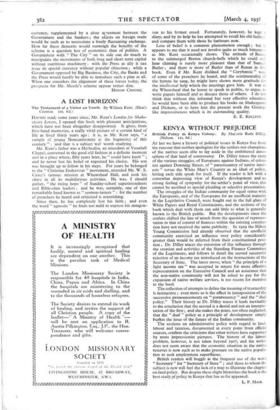KENYA WITHOUT PREJUDICE
British Policy in Kenya Colony. By Mar:orie Ruth Dilley. (Nelson. I2S. 6d.) AT last we have a history of political issues in Kenya free from the rancour that neither apologists for the settlers nor champions of the natives seem able to lay aside in the embittered atmo- sphere of that land of controversy. Dr. Dilley traces the story of the various struggles, of Europeans against Indians, of colon- ists against Downing Street, of " paramountcy of native inter- ests " versus the White Man's Country as an ideal of policy, letting each side speak for itself. If the reader is left with a somewhat depressing view of Kenya's development and no strong feeling of sympathy for the settler's point of view, this cannot be ascribed to special pleading or selective presentation.
The struggles of the Iridian community for equal status with the Europeans, and of the Europeans for an unofficial majority in the Legislative Council, were fought out in the full glare of White Papers and Royal Commissions, and the sections of the book which deal with them can add little to what is generally known to the British public. But the developments since the settlers shifted the line of attack from the question of represen- tation to that of control of finances within the existing constitu- tion have not received the same publicity. In 1929 the Hilton Young Commission had already observed that the unofficial community exercised an influence over policy considerably greater than would be inferred from their constitutional posi- tion ; Dr. Dilley traces the extension of this influence through the creation and activities of the Standing Finance Committee of the Legislature, and follows in detail the second successful rejection of an income tax introduced on the instructions of the Secretary of State. The latest move, when " the principle of a light income tax " was accepted in return for more effective representation on the Executive Council and an assurance that the non-native community will not be asked to pay for the expansion of native welfare services, is too recent for mention in the book The collection of attempts to define the meaning of trusteeship is instructive ; even more so is the effect in juxtaposition of the successive pronouncements on " paramountcy " and the " dual policy." Their history as Dr. Dilley traces it leads inevitably to the conclusion that the second is a denial and not an interpre- tation of the first; and she makes the point, too often neglected, that the " dual " policy as a principle of development simply burkes the issue of the future of the Indian community.
The sections on administrative policy with regard to land, labour and taxation, documented at every point from official sources, confirm the criticisms that other writers have supported by more impressionist pictures. The history of the labour problem, however, is not taken beyond 5927, and the writer does not seem aware that the economic situation in the native reserves is now such as to make pressure on the native popula- tion to seek employment superfhious.
British readers will boggle at the frequent use of the word " Secretary " for " Secretary of State " ; and those to whom the subject is new will feel the lack of a map to illustrate the chapter on land policy. But despite these slight blemishes the book is the best study of policy in Kenya that has so far appeared.
L. P. Mara.






































































 Previous page
Previous page